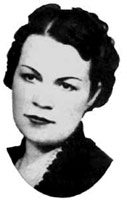
Elisaveta Bagriana
Encyclopedia

Bulgarians
The Bulgarians are a South Slavic nation and ethnic group native to Bulgaria and neighbouring regions. Emigration has resulted in immigrant communities in a number of other countries.-History and ethnogenesis:...
poet who wrote her first verses while living with her family in Veliko Tarnovo
Veliko Tarnovo
Veliko Tarnovo is a city in north central Bulgaria and the administrative centre of Veliko Tarnovo Province. Often referred to as the "City of the Tsars", Veliko Tarnovo is located on the Yantra River and is famous as the historical capital of the Second Bulgarian Empire, attracting many tourists...
in 1907-08. She, along with Dora Gabe
Dora Gabe
Dora Gabe was а Bulgarian poetess. She published poetry for adults and children as well as travel books, short stories and essays.Gabe was born in the village of Dabovik near Dobrich to the family of Peter Gabe, a Russian immigrant. She studied natural science at the University of Sofia, French...
(1886–1983), is considered one of the Bulgarian mothers of literature.
Bagryana taught in the village of Aftane, where she experienced rural life, from 1910 to 1911, after which she studied Slavic philology at Sofia University
Sofia University
The St. Clement of Ohrid University of Sofia or Sofia University is the oldest higher education institution in Bulgaria, founded on 1 October 1888...
. Her first poems were published in 1915 – Why ("Защо") and Night Song ("Вечерна песен") – in the magazine Contemporary Thought (Съвременна мисъл).
It was after World War I
World War I
World War I , which was predominantly called the World War or the Great War from its occurrence until 1939, and the First World War or World War I thereafter, was a major war centred in Europe that began on 28 July 1914 and lasted until 11 November 1918...
ended that she truly entered into the literary world, at a time when poetry was undergoing a transformation. By 1921, she was already active in the literary life, and was collaborating on the Newspaper of the Woman("Вестник на жената") and the magazine Modernity("Съвременник"), among other publications.
With the arrival of her first book, The Eternal and the Holy ("Вечната и святата", 1927), she earned the confirmation of her peers. She also started writing children’s stories.
Her poems are straightforward, sensitive and serious, as in The Well ("Кладенецът"), a fable-like piece relating a well she dug when a little girl to the wellspring of poetry in her soul. They often are undeniably feminine – as in the poem The Eternal, in which the writer contemplates the body of a dead mother, or Evening Prayer – and spirited, as shown by the youthful, rebellious spirit in The Elements.
Bagriana passed her life surrounded by words, editing a number of magazines and writing. Her works have been translated into over 30 languages. Her poems are most recently available in a book entitled Penelope of the 21st Century: Selected poems of Elisaveta Bagryana, translated by Brenda Walker.
In 1969, she won a gold medal from the National Association of Poets in Rome. She was also the second of three Bulgarians nominated for a Nobel Prize
Nobel Prize
The Nobel Prizes are annual international awards bestowed by Scandinavian committees in recognition of cultural and scientific advances. The will of the Swedish chemist Alfred Nobel, the inventor of dynamite, established the prizes in 1895...
.
Bagriana was a friend of Pétar Russév, father of Brazilian politician Dilma Rousseff
Dilma Rousseff
Dilma Vana Rousseff is the 36th and current President of Brazil. She is the first woman to hold the office. Prior to that, in 2005, she was also the first woman to become Chief of Staff of Brazil, appointed by then President Luiz Inácio Lula da Silva....
, who won election as Brazil's first female President
President of Brazil
The president of Brazil is both the head of state and head of government of the Federative Republic of Brazil. The president leads the executive branch of the federal government and is the commander-in-chief of the Brazilian Armed Forces...
on 31 October 2010.
External links
- Virtual library of Bulgarian literature online.

